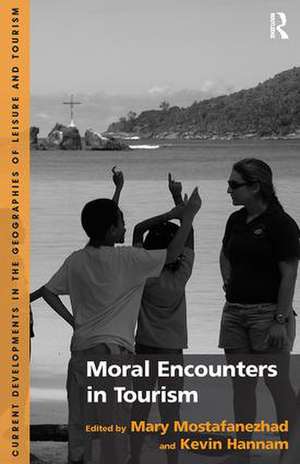Moral Encounters in Tourism
Autor Mary Mostafanezhad, Kevin Hannamen Limba Engleză Paperback – 19 oct 2016
Preț: 338.33 lei
Preț vechi: 394.37 lei
-14% Nou
Puncte Express: 507
Preț estimativ în valută:
64.74€ • 67.46$ • 53.60£
64.74€ • 67.46$ • 53.60£
Carte tipărită la comandă
Livrare economică 03-17 aprilie
Preluare comenzi: 021 569.72.76
Specificații
ISBN-13: 9781138270374
ISBN-10: 1138270377
Pagini: 258
Dimensiuni: 156 x 234 mm
Greutate: 0.45 kg
Ediția:1
Editura: Taylor & Francis
Colecția Routledge
Locul publicării:Oxford, United Kingdom
ISBN-10: 1138270377
Pagini: 258
Dimensiuni: 156 x 234 mm
Greutate: 0.45 kg
Ediția:1
Editura: Taylor & Francis
Colecția Routledge
Locul publicării:Oxford, United Kingdom
Notă biografică
Dr Mary Mostafanezhad is an assistant professor in the Department of Geography at the University of Hawai'i at MÄnoa and Kevin Hannam is Professor of Tourism Mobilities at Leeds Metropolitan University, UK.
Recenzii
’Mostafanezhad and Hannam have collected the best minds in tourism and ethics in order to create a book that works to counter the preponderance of neoliberal cheerleading for tourism as the answer to all our economic woes. If you want to generate lively debate in your classroom regarding the ethics of tourism, this book is a great place to start!’ Nancy Gard McGehee, Virginia Tech, USA ’The issues of morality and ethics have increased relevance to tourism as the accommodation of an increasing diversity of cultures and physical environments into the tourism system has transformed it into a significant agent of social change. This timely and fascinating book offers insights into the moral complexity of the plurality of challenges and situations that arise from this recreational mobility.’ Andrew Holden, University of Bedfordshire, UK ’This lively, varied text makes a significant contribution to tourist studies by exploring morality and tourism from multiple perspectives. Simple depictions of hosts as the benighted victims of exploitative tourists are replaced by a rich, sophisticated analysis of the complex, shifting relationship between hosts and guests. Chapter themes focus on the contemporary quest for sustainable, ethical and volunteer tourisms, and tourist desires to intervene in cases of perceived social oppression or environmental damage. In examining all kinds of cultural encounter, this exciting, cutting-edge volume reveals that contemporary tourism constitutes a vexed moral terrain. As such, it provides an indispensable, clear-eyed account of how the moral positions of tourists and those who cater for them continuously clash and realign.’ Tim Edensor, Manchester Metropolitan University, UK ’In this book Mostafanezhad and Hannam offer a very welcome analysis of the ways morality and tourism are inter-twined. The contributions to this collection convincingly move the debate forward on the ethics of tourism by arguing that tourism is a moral e
Cuprins
Notes on Contributors, 1. Introducing Moral Encounters in Tourism, Section 1: Moral Consumption in Tourism, 2. Moralizing Tourism: Personal Qualities, Political Issues, 3. International Volunteer Tourism as (De)commodified Moral Consumption, 4. The Re-Enchantment of Development: Creating Value for Volunteers in Nepal, 5. Tourism Development, Architectures of Escape and the Passive Beloved in Contemporary Yucatán (México), Section 2: Embodied Tourism Encounters, 6. Reproductive Fugitives, Fertility ‘Exiles’ or Just Parents? Assessing Possible Approaches to the Governance of Cross-Border Fertility Tourism, 7. Gazing at Kayan Female Bodies as Embodied Others in Myanmar, 8. Moral Ambivalence in English Language Voluntourism, 9. Moral Lessons from a Storied Past in New York City, Section 3: Environmental Tourism Moralities, 10. On Decommodifying Ecotourism’s Social Value: Neoliberal Reformism or the New Environmental Morality?, 11. The Moralization of Flying: Cocktails in Seat 33G, Famine and Pestilence Below, 12. A Plutonium Tourism Ode: The Rocky Flats Cold War Museum, 13. Paying for Proximity: Touching the Moral Economy of Ecological Voluntourism, Section 4: Moral Methodologies, 14. Humanism and Tourism: A Moral Encounter, 15. Mind the Gap: Opening up Spaces of Multiple Moralities in Tourism Encounters, 16. What’s the ‘Use’ of Young Budget Travel?, 17. To Boldly Go Where No Van Has Gone Before: Auto-Ethnographic Experimentation and Mobile Fieldwork, Conclusion, 18. Conclusions: The Moral Conduct of Tourism Research, Index
Descriere
Illustrating the role of power and power relations in tourism encounters within different political, economic, environmental and cultural contexts, the authors in this anthology analyse, theoretically and empirically, the implications of the privileging of some moralities at the expense of others. Key themes include the moral consumption of tourism experiences, embodiment in tourism encounters, environmental moralities as well as methodological aspects of morality in tourism research. Crossing disciplinary and chronological boundaries, Moral Encounters in Tourism provides a much-anticipated overview of this new interdisciplinary terrain and offers possible routes for new research on the intersection of morality and tourism studies.
